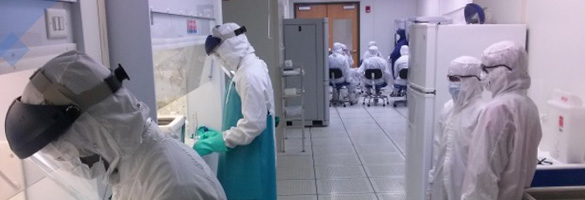Master of Science in Electronics Engineering with a track in Biomedical Engineering Online
Propel your career by enhancing your understanding of the principles and design concepts that fuse electronics engineering with the fields of medicine and biology.
Home Degrees Technology Electronics Engineering Master of Science in Electronics Engineering with a track in Biomedical Engineering
Program Overview
Get to know our 100% online master's in Electronics Engineering – Biomedical Engineering Program

Advance in this in-demand field as a specialized and highly skilled engineer ready for the challenge of designing and fabricating medtech products and sustaining systems. The online Master of Science in Electronics Engineering with a track in Biomedical Engineering program at NSU offers you a direct path toward growing your engineering expertise to fit the evolving needs of the healthcare industry and its many biotechnologies.
The specialized coursework in this graduate program is rigorous and focuses on the application of engineering principles and design concepts to the field of medicine and biology. You will apply your learnings to developing and maintaining embedded systems to activate life-enhancing and life-sustaining products. You will culminate your learning experience with an advanced project and graduate ready for leading positions or extended Ph.D. work.
Graduates of the online M.S. Electronics Engineering – Biomedical Engineering will:
- Analyze and design feedback amplifiers, including stability and compensation
- Design large-scale integrated analog/digital circuits for telecommunication application
- Evaluate the performance of modern digital communication systems
- Understand and utilize microprocessor and peripheral system programming, I/O interfacing and interrupt management
- Utilize CAD tools for design entry and simulation
- Analyze and design feedback amplifiers, including stability and compensation
- Design large-scale integrated analog/digital circuits for telecommunication application
- Evaluate the performance of modern digital communication systems
- Understand and utilize microprocessor and peripheral system programming, I/O interfacing and interrupt management
- Utilize CAD tools for design entry and simulation
Career opportunities:
- Biomedical Engineer
- Biomedical Instrumentation Design Engineer
- Bio-Instrumentation System Integrator
- Biomedical Engineer
- Biomedical Instrumentation Design Engineer
- Bio-Instrumentation System Integrator
Also available:
NSU offers the online M.S. Electronics Engineering in a variety of tracks. View all options.
Ranked #8
among “HBCU Schools Offering Engineering Programs” by HBCU Colleges (2018)
Need More Information?
Call 877-660-0459
Call 877-660-0459
Tuition
Earn your master’s electronics biomedical engineering affordably
Our student-centered focus is reflected in our affordable tuition for the online M.S. Electronics Engineering – Biomedical Engineering. Gain a top-tier Norfolk State University education and benefit from the flexibility of paying by the course.
Tuition breakdown:
| Program | Per Credit Hour | Per Course | Per Program |
|---|---|---|---|
| M.S. Electronics Engineering – Biomedical Engineering | $450 | $1,350 | $13,500 |
*Tuition and fees are subject to change at any time.
Tuition breakdown:
Calendar
Add these important dates to your calendar
With 7-week courses and multiple start dates a year, the online programs at NSU are designed to be ideal for working professionals.
Now enrolling:
| Term | Start Date | App Deadline | Document Deadline | Registration Deadline | Tuition Deadline | Class End Date |
|---|---|---|---|---|---|---|
| Spring 1 | 1/21/25 | 1/10/25 | 1/15/25 | 1/21/25 | 1/21/25 | 3/7/25 |
| Summer 1 | 5/12/25 | 4/28/25 | 4/28/25 | 5/10/25 | 5/10/25 | 6/27/25 |
Now enrolling:
Have questions or need more information about our online programs?
Ready to take the rewarding path toward earning your degree online?
Admissions
Check that you meet the master’s electronics engineering – biomedical admission criteria
The online M.S. Electronics Engineering – Biomedical Engineering program features a streamlined admission process to help you get started quickly and easily. View the full requirements for admission below.
- Bachelor’s degree in a related field
- 2.8 GPA or higher
- 3 Letters of recommendation
Applicants to the NSU Online M.S. Electronics Engineering – Biomedical Engineering program must meet the following criteria for admission:
- 2.8 GPA or higher
- Specific undergraduate degree relevancy is required. Strong mathematics background is preferred. Bachelor’s degrees may include:
- Electrical or electronics engineering
- Physics
- Mathematics
- Computer engineering
- Electronics engineering technology
- Three letters of professional recommendations, including one from a former professor (if possible). Letters from personal contacts will not be accepted.
- One statement of purpose
- Resume or CV
- Professional work experience is not required
Courses
Expand your skills in the master’s electronics engineering – biomedical courses
For the online M.S. Electronics Engineering – Biomedical Engineering program, you must complete 10 courses totaling 30 credit hours, including 15 credit hours of core courses and 15 credit hours of electives.
Ranked #12
Among HBCU institutions in the U.S. by HBCU Colleges (2018)
Request more information
Submit this form, and an Enrollment Specialist will contact you to answer your questions.
Or call 877-660-0459
By submitting this form, I am providing my digital signature agreeing that Norfolk State University (NSU) and its agent, Risepoint, may email me or contact me regarding educational services by telephone and/or text message utilizing automated technology or a pre-recorded message at the telephone number(s) provided above. I understand this consent is not a condition to attend NSU or to purchase any other goods or services. Privacy Policy. SMS Terms
Begin Application Process
Start your application today!
for help with any questions you may have.